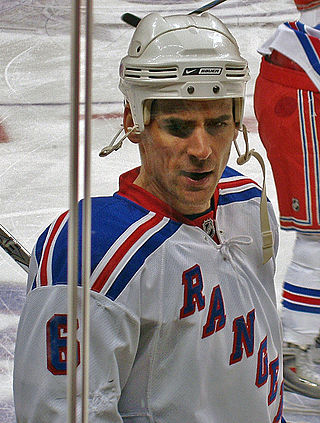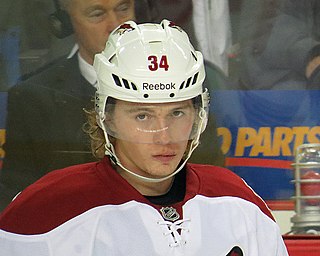
Wade Redden is a Canadian former professional ice hockey player and a development coach of the Ottawa Senators, with whom he spent the majority of his career in the National Hockey League (NHL), which lasted from 1996 to 2013. He also played for the New York Rangers, St. Louis Blues and Boston Bruins. He played for the Canadian national team internationally seven times, winning two gold medals in the World Junior Championships and one in the World Cup of Hockey. He was a two-time NHL All-Star.
The NHL Collective Bargaining Agreement (CBA) is the basic contract between the National Hockey League (NHL) and the NHL Players' Association (NHLPA), designed to be arrived at through the typical labour–management negotiations of collective bargaining. On January 6, 2013, an agreement was tentatively reached after a labour dispute cancelled 510 regular season games of the 2012–13 season, and was ratified by the league's Board of Governors on January 9, 2013, as well as by the NHLPA membership three days later on January 12, 2013. As originally signed, the 2013 CBA was a 10-year deal, longest in NHL history, expiring after the 2021–22 season. On July 10, 2020, the NHL and NHLPA announced the extension of the CBA through the 2025–26 NHL season.

Sean Christopher Avery is a Canadian former professional ice hockey player. During his career in the National Hockey League (NHL), he played left wing for the Detroit Red Wings, Los Angeles Kings, New York Rangers, and Dallas Stars, gaining recognition for controversial and disrespectful behaviour both on and off the ice. His agitating playing style led to multiple teams waiving him and to having a contract terminated. He led the league in penalty minutes twice, during the 2003–04 and 2005–06 NHL seasons.
The 2004–05 NHL lockout was a labor lockout that resulted in the cancellation of the National Hockey League (NHL) season, which would have been its 88th season of play.

Scott Carlos Gomez is an American professional ice hockey coach and former player.
The 1994–95 NHL lockout was a lockout that came after a year of National Hockey League (NHL) hockey that was played without a collective bargaining agreement. The lockout was a subject of dispute as the players sought collective bargaining and owners sought to help franchises that had a weaker market as well as make sure they could cap the rising salaries of players. The lockout caused the 1994–95 season to be delayed and shortened to 48 games instead of 84 or 82, the shortest season in 53 years.

Evan Brooks Laich is a Canadian former professional ice hockey forward. He played over 750 National Hockey League (NHL) games across four teams: the Ottawa Senators, Washington Capitals, Toronto Maple Leafs and the Los Angeles Kings.

Kyle Wellwood is a Canadian former professional ice hockey centre who played the majority of his career in the National Hockey League (NHL). He was originally selected by the Toronto Maple Leafs 134th overall in the 2001 NHL Entry Draft, playing his first three seasons in the NHL with Toronto before joining the Vancouver Canucks in 2008.

Aaron Rome is a Canadian former professional ice hockey defenceman. He is currently serving as a skills coach with the Brandon Wheat Kings in the Western Hockey League (WHL). Rome was selected in the fourth round of the 2002 NHL Entry Draft by the Los Angeles Kings.

Timothy J. Kennedy is an American former professional ice hockey forward, who played in the National Hockey League (NHL) with the Buffalo Sabres, Florida Panthers, San Jose Sharks and the Phoenix Coyotes.
The NHL salary cap is the total amount of money that National Hockey League (NHL) teams are allowed to pay their players. It is a "hard" salary cap, meaning there are no exemptions.

Jarred Michael Tinordi is an American professional ice hockey defenseman for the Chicago Blackhawks of the National Hockey League (NHL). He was drafted by the Montreal Canadiens 22nd overall in the 2010 NHL Entry Draft. He was also drafted in the seventh round by Metallurg Magnitogorsk during the 2010 KHL Junior Draft.

Kyle Frank Clifford is a Canadian professional ice hockey forward currently playing for the Toronto Marlies in the American Hockey League (AHL) while under contract to the Toronto Maple Leafs of the National Hockey League (NHL). He was selected by the Los Angeles Kings in the second round of the 2009 NHL Entry Draft. Clifford is a two-time Stanley Cup champion with the Kings.
The 2012–13 NHL season was the 96th season of operation of the National Hockey League (NHL). The regular season began on January 19, 2013, and ended on April 28, 2013, with the playoffs to follow until June.

Lance Gordon Bouma is a Canadian professional ice hockey centre who is currently playing with the Linköping HC of the Swedish Hockey League (SHL). He previously played in the National Hockey League (NHL) with the Calgary Flames and Chicago Blackhawks. He was a third round selection of the Flames, 78th overall, in the 2008 NHL Entry Draft and made his NHL debut in January 2011. As a junior, he was a member of the Vancouver Giants team that won the 2007 Memorial Cup.

Nick Petersen is a Canadian professional ice hockey player who is currently playing for EC KAC of the ICE Hockey League (ICEHL). He was selected by the Pittsburgh Penguins in the fourth round of the 2009 NHL Entry Draft.
The 2012–13 NHL lockout was a labor dispute between the National Hockey League (NHL) and the National Hockey League Players' Association (NHLPA) that began at 11:59 pm EDT on September 15, 2012. A tentative deal on a new collective bargaining agreement (CBA) was reached on January 6, 2013, with its ratification and signing of a memorandum of understanding on the agreement completed by January 12, 2013, 119 days after the expiry of the previous CBA.

Éric Gélinas is a Canadian professional ice hockey defenceman who is currently playing with HC Ajoie of the National League (NL). He was selected by the New Jersey Devils in the second round, 54th overall, at the 2009 NHL Entry Draft.
The following is a list of all team-to-team transactions that have occurred in the National Hockey League during the 2013–14 NHL season. It lists what team each player has been traded to, signed by, or claimed by, and for which player(s) or draft pick(s), if applicable. Players who have retired are also listed. The 2013–14 trade deadline was on March 5, 2014. Any players traded or claimed off waivers after this date were eligible to play up until, but not in, the 2013–14 NHL playoffs.
The following is a list of all team-to-team transactions that have occurred in the National Hockey League (NHL) during the 2018–19 NHL season. It lists which team each player has been traded to, signed by, or claimed by, and for which player(s) or draft pick(s), if applicable. Players who have retired are also listed.The 2018–19 NHL trade deadline was on February 25, 2019. Players traded after this date were not eligible to play in the 2019 Stanley Cup playoffs.












